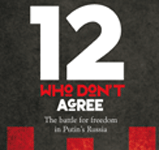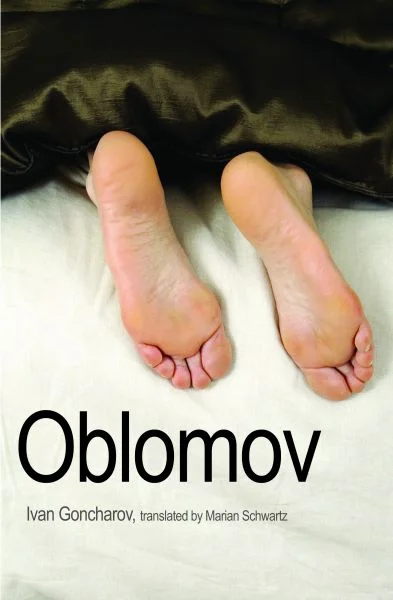In the chaos of early-1990s Russia, a paralyzed veteran’s wife and stepdaughter conceal the Soviet Union’s collapse from him in order to keep him—and his pension—alive, until it turns out the tough old man has other plans. An instant classic of post-Soviet Russian literature, Olga Slavnikova’s The Man Who Couldn’t Die tells the story of how two women try to prolong a life—and the means and meaning of their own lives—by creating a world that doesn’t change, a Soviet Union that never crumbled.
Read MoreIn the chaos of early-1990s Russia, a paralyzed veteran’s wife and stepdaughter conceal the Soviet Union’s collapse from him in order to keep him—and his pension—alive, until it turns out the tough old man has other plans. An instant classic of post-Soviet Russian literature, Olga Slavnikova’s The Man Who Couldn’t Die tells the story of how two women try to prolong a life—and the means and meaning of their own lives—by creating a world that doesn’t change, a Soviet Union that never crumbled.
Read MoreA French theater agrees to stage the latest work by Filippov--the mmost prestigious and lucrative opportunity of his infamous career--but first he must sever ties with his longtime collaborator and childhood friend. So the internationally acclaimed Russian director makes a reluctant trip back to his hometown to deliver the news. His journey to the Far North, where the temperature remains dangerously low all winter, unexpectedly blurs the distinction between reality and art for this virtuoso, who prides himself on his ability to create shocking scenes and outrageous situations. And after the city's power grid goes off-line, the brutal cold just might get the better of him.
Read MoreCalligraphy Lesson: The Collected Stories is the first English-language collection of short stories by Mikhail Shishkin, the most acclaimed contemporary author in Russia, including four stories that have been published in various English-language sources (Words Without Borders, Read Russia Anthology, Spolia, the Independent) and four previously untranslated stories (including two previously unpublished in any language). Shishkin was the first (and still the only) writer to win the three major Russian literary awards (the Russian Booker, National Bestseller, and Big Book awards). He is a master prose writer in the timeless, breathtakingly beautiful style of the greatest Russian writers, such as Leo Tolstoy, Ivan Bunin, and Boris Pasternak.
Read MoreThe first young adult novel translated from Russian, a brave coming-out, coming-of-age story.In June 2013, the Russian government passed laws prohibiting "gay propaganda," threatening jail time and fines to offenders. That same month, in spite of these harsh laws, a Russian publisher released Playing a Part, a young adult novel with openly gay characters. It was a brave, bold act, and now this groundbreaking story has been translated for American readers.
Read MoreTolstoy's romantic Anna, long-suffering Karenin, dashing Vronsky, and dozens of their family members, friends, and neighbors are among the most vivid characters in world literature. In the thought-provoking Introduction to this volume, Gary Saul Morson provides unusual insights into these characters, exploring what they reveal about Tolstoy's radical conclusions on romantic love, intellectual dishonesty, the nature of happiness, the course of true evil, and more.
Read MoreWalpurgis Night, by acclaimed Russian writer Venedikt Erofeev, is considered a classic in the playwright's homeland. Erofeev's dark and funny five-act satire of Soviet repression has been called the comic high-water mark of the Brezhnev era. Walpurgis Night dramatizes the outrageous trials of Lev Isakovich Gurevich, an alcoholic half-Jewish dissident poet confined by the state to a hospital for the insane. In "Ward 3"—a microcosm of repressive Soviet society—Gurevich deploys his brilliant wit and ingenuity to bedevil his jailers, defend his fellow inmates, protest his incarceration, and generally create mayhem, which ultimately leads to a tragedy of Shakespearean proportions.
Read MoreHigh Society Dinners offers extraordinary insight into the domestic arrangements of the Russian aristocracy, presenting nine months' worth of menus served in St Petersburg to the guests of Petr Durnovo (1835–1918), Adjutant-General of the Tsar's Imperial Suite, part of an important late nineteenth-century dynasty that included ministers and high officials. The menus themselves would be useful enough for what they reveal about culinary culture in Russia, but Yuri Lotman's commentary is invaluable, dissecting the dining rituals and social circles of the participants. Durnovo's menus and guest lists, interspersed with extracts from family letters and the leading newspapers and journals of the day, set in context the domestic and gastronomic underpinnings of life in this group at the heart of the Russian empire.
Read MoreWith icons like Chubby Checker and Yuri Gagarin, the Moscow that Svyatoslav Semyonovich inhabits at the onset of the Cold War brims with the flashy visual textures of capitalism. A Jewish teenager on the hunt for black-market tight pants and rock records, Svyatoslav somehow fails to develop his undying love for Lyuba into a happy ending. He finds work in a mental institution, runs off to Kiev with one of the patients, marries a few times, has a son, becomes a professor, and halfheartedly runs interference for the KGB. Always taking great pleasure in the experiences of others, including his patients and lovers, Svyatoslav flounders through his own life but never loses sight of Lyuba, his biblical Rachel, his great love.
Read MoreAlmost half a century ago, in 1966, a book was published unofficially via samizdat in the Soviet Russia. A book that both terrified and dazzled the literary establishment. This was Yuri Mamleyev's novel, Shatuny, today published in English as The Sublimes. This comical and metaphysical novel is somewhere between Dostoyevski and A Clockwork Orange, full of philosophy, humour, esotericism and spiritualism. Over the years, the novel became a cult classic, and Russia produced Mamleev's literary followers like Vladimir Sorokin and Victor Pelevin who continued exploring the limits of mankind and the dark side of humanity.
Read MoreIt is the summer of 1945. Germany has been defeated, Hitler has disappeared, and tensions are mounting ever higher along the Russian-Chinese border…where the threat of Japanese invasion haunts.
For Petka, no life could be more thrilling and glorious than marching into battle alongside the Red Army. But he is only twelve, the bastard child of a fractured family, trapped in a village too tiny for his bursting spirit. So he must make his own adventure wherever he can find it. And if that means passing off a wolf cub as a puppy under the nose of his ferocious grandma, stealing bootleg alcohol for the bivouacked troops he worships, smuggling himself in a barrel across the border and into the line of fire, fighting for his life when his own aimless peers turn inexplicably vicious, or befriending an enigmatic Japanese POW who transcends Petka’s provincial world, then so be it.
Read MoreThe year is 1871. Prince von Ahrensburg, Austria's military attaché to St. Petersburg, has been killed in his own bed. The murder threatens diplomatic consequences for Russia so dire that they could alter the course of history. Leading the investigation into the high-ranking diplomat's death is Chief Inspector Ivan Putilin, but the Tsar has also called in the notorious Third Department - the much-feared secret police - on the suspicion that the murder is politically motivated. As the clues accumulate, the list of suspects grows longer; there are even rumors of a werewolf at large in the capital. Suspicion falls on the diplomat's lover and her cuckolded husband, as well as Russian, Polish and Italian revolutionaries, not to mention Turkish spies. True to his maxim that "coincidence and passion are the real conspirators," Putilin seeks answers inside the diplomatic circus as well, which leads him to struggles with criminals and with the secret police itself. When the mystery is solved, the only person who saw it coming was Putilin.
Read MoreIt is the summer of 1945. Germany has been defeated, Hitler has disappeared, and tensions are mounting ever higher along the Russian-Chinese border…where the threat of Japanese invasion haunts.
For Petka, no life could be more thrilling and glorious than marching into battle alongside the Red Army. But he is only twelve, the bastard child of a fractured family, trapped in a village too tiny for his bursting spirit. So he must make his own adventure wherever he can find it. And if that means passing off a wolf cub as a puppy under the nose of his ferocious grandma, stealing bootleg alcohol for the bivouacked troops he worships, smuggling himself in a barrel across the border and into the line of fire, fighting for his life when his own aimless peers turn inexplicably vicious, or befriending an enigmatic Japanese POW who transcends Petka’s provincial world, then so be it.
Read MoreDay after day the Russian asylum-seekers sit across from the interpreter and Peter—the Swiss officers who guard the gates to paradise—and tell of the atrocities they’ve suffered, or that they’ve invented, or heard from someone else. These stories of escape, war, and violence intermingle with the interpreter’s own reading: a history of an ancient Persian war; letters sent to his son “Nebuchadnezzasaurus,” ruler of a distant, imaginary childhood empire; and the diaries of a Russian singer who lived through Russia’s wars and revolutions in the early part of the twentieth century, and eventually saw the Soviet Union’s dissolution.
Read MoreBased largely on formerly top-secret Soviet archival documents (including 66 reproduced documents and 70 illustrations), this book portrays the inner workings of the communist party and secret police during Germany's horrific 1941–44 siege of Leningrad, during which close to one million citizens perished. It shows how the city's inhabitants responded to the extraordinary demands placed upon them, encompassing both the activities of the political, security, and military elite as well as the actions and attitudes of ordinary Leningraders.
Read MoreKazimir Malevich's painting "Black Square" is one of the twentieth century's emblematic paintings, the visual manifestation of a new period in world artistic culture at its inception. None of Malevich's contemporary revolutionaries created a manifesto, an emblem, as capacious and in its own way unique as this work; it became both the quintessence of the Russian avant-gardist's own art—which he called Suprematism—and a milestone on the highway of world art. Writing about this single painting, Aleksandra Shatskikh sheds new light on Malevich, the Suprematist movement, and the Russian avant-garde.
Read MoreA French theater agrees to stage the latest work by Filippov--the mmost prestigious and lucrative opportunity of his infamous career--but first he must sever ties with his longtime collaborator and childhood friend. So the internationally acclaimed Russian director makes a reluctant trip back to his hometown to deliver the news. His journey to the Far North, where the temperature remains dangerously low all winter, unexpectedly blurs the distinction between reality and art for this virtuoso, who prides himself on his ability to create shocking scenes and outrageous situations. And after the city's power grid goes off-line, the brutal cold just might get the better of him.
Read MoreIn Twelve Who Don’t Agree, journalist Valery Panyushkin profiles twelve Russians from across the country’s social spectrum: a politician, a journalist, an army officer, an author, a bank manager, a laborer, a university student . . . Despite varied backgrounds, they all have one thing in common—participation in the historic March of the Dissidents.
Read More2017 is part literary romance, part political thriller, and a stunning tale of adventure, fantasy and obsession. Set in the near future, on the 100th anniversary of the Revolution, 2017 reveals a Russia devoid of art and innovation, but full of danger, scandal, and wildly intriguing characters. With its harsh climate, social and ecological problems, its impoverished underclass and criminal upper class, the mythical Riphean Mountains become the perfect setting for this stunningly crafted Russian favorite.
Read MoreSet at the beginning of the nineteenth century, when idleness was still looked upon by Russia’s serf-owning rural gentry as a plausible and worthy goal, Ivan Goncharov’s Oblomov follows the travails of an unlikely hero, a young aristocrat incapable of making a decision. Indolent, inattentive, incurious, given to daydreaming and procrastination, Oblomov clearly predates the ideal of the industrious modern man, yet he is impossible not to admire through Goncharov’s masterful prose.
Read More


















